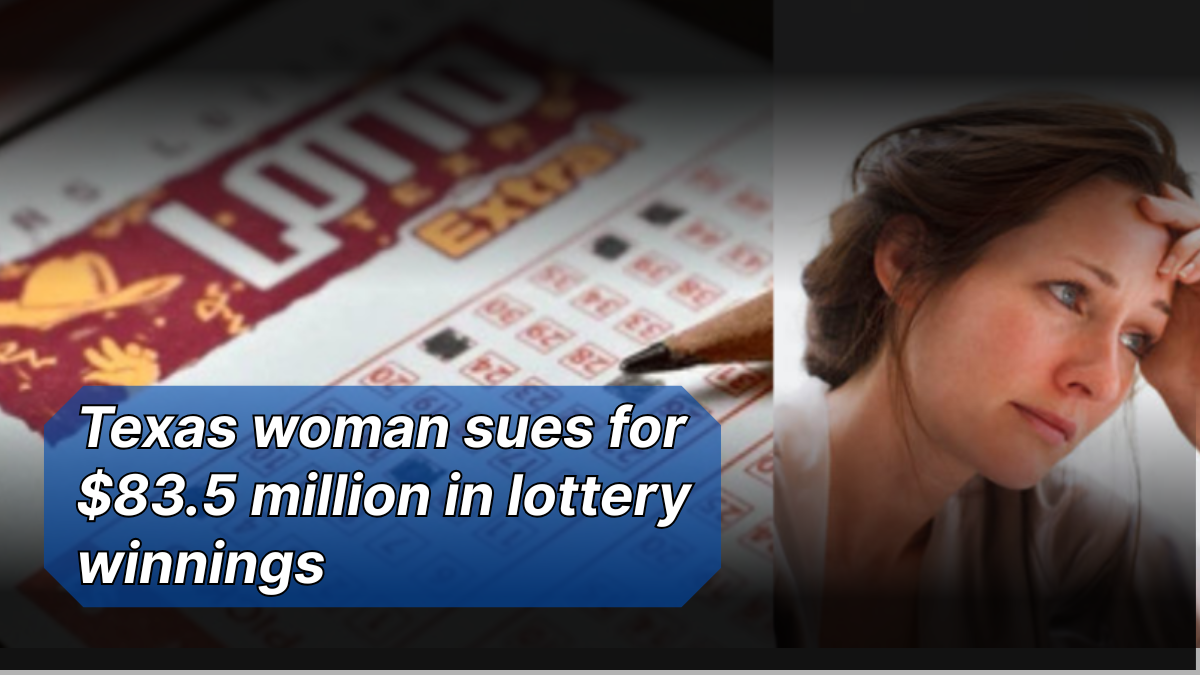A Texas woman has filed a high-profile lawsuit against the Texas Lottery Commission, alleging that she was wrongly denied an $83.5 million jackpot despite holding the winning ticket. The plaintiff, referred to as “Jane Doe” in court documents, claims she purchased her ticket legally through a third-party app and fulfilled all submission requirements, only to have her claim dismissed amid a sudden policy shift.
Summary Table: Texas Woman Sues for $83.5 Million

| Key Detail | Description |
|---|---|
| Claim | Texas woman suing for $83.5 million lottery prize |
| Plaintiff | Jane Doe (pseudonym) |
| Ticket Purchased | February 17 via Jackpocket app (Winners Corners) |
| Ticket Submitted | March 18 |
| Issue | Alleged refusal to pay due to unregulated courier service |
| Texas Lottery Commission Response | No payment issued; policy change announced a week later |
| Governor’s Statement | Concern for integrity of the system; potential investigation |
| Regulated States | New York, New Jersey, Arkansas |
| Official Site | Texas Lottery Commission |
The Winning Ticket and How It Was Purchased
Jane Doe purchased her lottery ticket on February 17, 2025, using a digital platform called Jackpocket. Jackpocket operates through a third-party retailer known as Winners Corners, based in Austin, Texas. This method allows users to buy official lottery tickets digitally, with the physical ticket being purchased and stored on their behalf.
On March 18, a month after the purchase, Jane Doe submitted her winning ticket to the Texas Lottery Commission. Despite following what she believed to be proper protocol, her claim for the $83.5 million prize went unpaid.
Legal Arguments and Allegations
According to the lawsuit, the Texas Lottery Commission did not immediately declare the ticket invalid. Instead, a week after Jane Doe submitted her ticket, the Commission issued an announcement stating it would ban the purchase of lottery tickets through unregulated courier services like Winners Corners.
The lawsuit argues that this change in policy should not be applied retroactively and that Jane Doe’s winning ticket, purchased and submitted prior to the rule change, must be honored.
“Every Texan knows what that should mean when it comes to the lottery – if you win, you should get paid,” the lawsuit states. “It should not take a lawsuit to get paid when you win the lottery. But that’s exactly what has happened here.”
Governor Greg Abbott’s Response
Texas Governor Greg Abbott issued a statement in February expressing concern over the integrity of the state lottery system. While he did not specifically mention Jane Doe’s case, he alluded to possible investigations underway and emphasized that Texans must be able to trust the process.
“Texans must be able to trust in our state’s lottery system and know that the lottery is conducted with integrity and lawfully,” said Abbott.
Commission Under Scrutiny
Amid the controversy, Texas Lottery Executive Director Ryan Mindell stepped down from his position in April 2025. His resignation coincided with a wave of scrutiny, including multiple internal investigations into how the Commission manages winning claims and enforces rule changes.
The timing has raised eyebrows among lottery observers and players alike, with many questioning whether leadership changes are linked to the denial of Doe’s prize.
Legal Standing of Lottery Courier Services
Currently, only three U.S. states—New York, New Jersey, and Arkansas—formally regulate lottery courier services. Texas is not among them, which places apps like Jackpocket in a gray area. While widely used by players for convenience, these apps have no official oversight or regulation by the Texas Lottery Commission.
The plaintiff’s legal team argues that this lack of regulation does not justify a retroactive denial of winnings. In fact, Doe’s lawsuit claims the Commission is using the new policy as an ex post facto excuse to sidestep paying a legitimate jackpot claim.
Legal and Financial Ramifications
If successful, Jane Doe’s lawsuit could have wide-ranging implications for the Texas Lottery Commission and lottery systems in other states that have not yet regulated courier services. A ruling in her favor might compel commissions to honor claims made via currently unregulated, yet commonly used, platforms.
Conversely, a ruling against her could set a precedent that allows lottery commissions to retroactively apply new policies—potentially undermining consumer trust.
Public Reaction and Media Coverage
Public response to the lawsuit has been mixed. Many Texans support Doe, believing she was unfairly targeted after the fact. Others argue the use of unregulated services poses security and accountability risks that warrant caution.
Media outlets including CNN and UPI have covered the story closely. Some investigative journalists have suggested that the Commission’s sudden rule change may have been influenced by the size of the prize or pressure from state authorities.
What Happens Next?
The case is still in its early stages, and a court date has not yet been publicly announced. Legal experts predict a lengthy process as both sides prepare for what could become a landmark case in consumer protection and lottery law.
Doe’s attorneys are expected to push for an injunction that would force the Commission to pay out the prize or place the funds in escrow until the case is resolved. Meanwhile, lottery regulators in other states may revisit their own policies to prevent similar controversies.
Frequently Asked Questions
Q: Is Jackpocket legal in Texas?
A: Jackpocket operates in Texas but is not officially regulated by the Texas Lottery Commission. Purchases made through the app are fulfilled by third-party retailers like Winners Corners.
Q: Why did the Commission refuse to pay the prize?
A: The Commission cited a new policy banning unregulated courier services, which was announced after the ticket was submitted. Jane Doe’s lawyers argue that the rule should not apply retroactively.
Q: Can the Commission legally change rules after a drawing?
A: The lawsuit contends that the Commission cannot enforce retroactive rules, especially those affecting past drawings and claims.
Q: What should I do if I used a courier app to buy a lottery ticket?
A: If you have a winning ticket, submit it promptly and consult legal counsel if you encounter issues. Monitor the app’s terms of service and any relevant state lottery announcements.
Q: Where can I find official updates?
A: Visit the Texas Lottery Commission’s official website for the latest updates and official statements.
Conclusion
Jane Doe’s legal battle against the Texas Lottery Commission over an $83.5 million prize is more than a personal dispute—it’s a test of consumer rights and regulatory transparency in the digital age. As lottery technology evolves, this case may become a turning point in how states manage digital ticket purchases and enforce rules surrounding massive jackpots.
While the outcome remains uncertain, the broader implications of this lawsuit are likely to influence how lottery systems operate across the country for years to come.
For More Information Click Here







